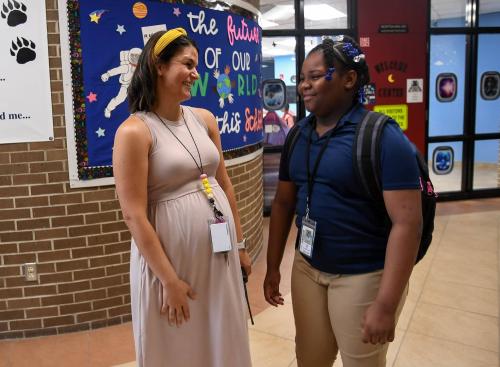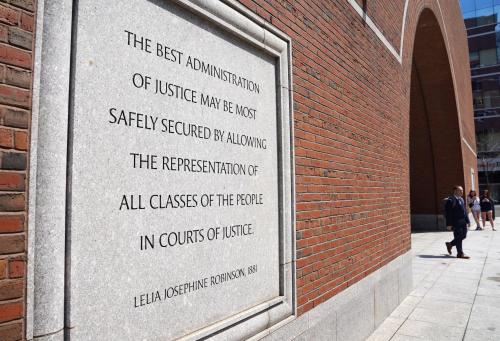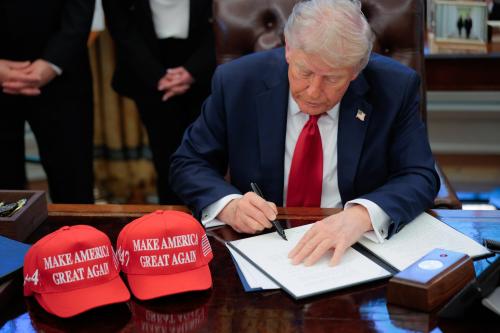

4:00 pm EDT - 5:00 pm EDT
Past Event
On Sept. 15, 2025, the Brown Center on Education Policy at Brookings hosted a webinar featuring leading education scholars and civil rights attorneys to discuss the status of recent litigation challenging the Trump administration’s K-12 education agenda. The discussion focused on the legality of recent executive actions targeting schools’ support for DEI and the rights of transgender students. Panelists included Alice O’Brien from the National Education Association, Ray Li from the NAACP Legal Defense and Educational Fund, and Leah Watson from the ACLU. Brookings Fellow Rachel M. Perera moderated the discussion.
Perera opened the discussion with a short summary of the Trump K-12 education litigation tracker—a new data tool recently published by the Brown Center in collaboration with UC Law SF’s Center for Racial and Economic Justice. The tracker summarizes the status of legal challenges to the Trump administration’s most consequential executive actions targeted toward K-12 public schools.
Perera opened the discussion by asking each of the three panelists to highlight their most important takeaways for education leaders. Alice O’Brien emphasized that the Trump administration has “weaponized civil rights enforcement,” to implement its anti-DEI agenda, along with the “[disabling of] supports for our K-12 [public] schools.” At the same time, she noted, the administration has pushed to privatize K-12 education through a national private school voucher program included in the One Big Beautiful Bill.
Ray Li described recent shifts in education civil rights enforcement—including a wave of executive actions, grant terminations, and targeted Office for Civil Rights investigations—as “regulating by threat, not by lawmaking.” Li emphasized that with this “regulating by threat” approach, the administration is seeking “anticipatory compliance” from states and school districts. Thus, Li stressed the importance of seeking legal counsel when education leaders have specific questions about where the actual legal lines are and whether different education programs and activities are permissible under federal civil rights law.
The conversation then turned to DEI and federal civil rights law. Leah Watson stressed that the administration, “cannot overturn decades of federal anti-discrimination law,” despite rhetoric to the contrary and misrepresentations of what is legal versus illegal in executive orders and other guidance released by the U.S. Department of Education (ED). Watson expressed concern over the administration’s efforts to use civil rights law as a tool for censorship. Though, she also stressed that there are opportunities for education leaders to “hold the line on DEI,” rather than overcomply and eliminate programs and policies that are compliant under federal civil rights law.
Watson also pointed out that “no court has declared all forms of DEI to be illegal.” Moreover, as both Watson and Li highlighted, the administration has not defined what practices or programs are considered “illegal DEI” in any concrete terms. As a result, the administration’s attempts to declare DEI illegal—including a Feb. 14 nonbinding guidance letter from the Education Department on Title VI and DEI—have already drawn numerous legal challenges and seen some early success. For example, Watson discussed a recent federal court decision which found the Feb. 14 Dear Colleague letter (and accompanying state certification requirements) unlawful and vacated the relevant executive actions.
Li clarified that the legality of a program under federal civil rights law depends less on its name and more on whether it creates a hostile environment on campus through racially discriminatory treatment of students. As such, “there is nothing prohibiting schools from pursuing racially inclusive campuses.” In fact, they are required to do so under federal anti-discrimination law, which remains unchanged.
Perera then turned the conversation to the legality of ED dictating changes to local public schools’ curriculum and programming. The panelists all stressed that the Trump administration’s efforts to dictate local school curriculum decisions using executive actions is prohibited under current federal law. O’Brien also emphasized that the federal government does not have the right to override the academic standards set for schools by state education agencies and local school boards.
O’Brien also noted that despite the administration’s claims to the contrary, Title IX and recent federal court rulings support public schools’ adoptions of gender inclusive policies—including policies that allow students to use school facilities consistent with their gender identity. Li also noted that the administration can only withhold major sources of federal funding as penalty for civil rights violations after significant legal review.
The panelists concluded by emphasizing the importance of clear communication between education leaders and school board members about the status of litigation challenging the Trump K-12 education agenda.
Moderator

Related Content

Rachel M. Perera, Thalia González, Aidan Tomlinson
September 8, 2025

Rachel M. Perera, Thalia González, Aidan Tomlinson
September 8, 2025

Rachel M. Perera, Thalia González, Aidan Tomlinson
September 8, 2025

Jon Valant, Kenneth K. Wong, Michael Hansen, Katharine Meyer, Rachel M. Perera
January 20, 2026

Daphna Bassok, Isabelle Fares, Molly Michie, Kate Miller-Bains, Kennedy Weisner
January 20, 2026

Bruce Fuller
January 16, 2026